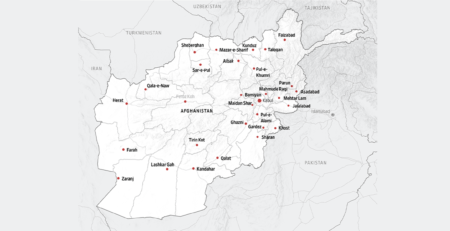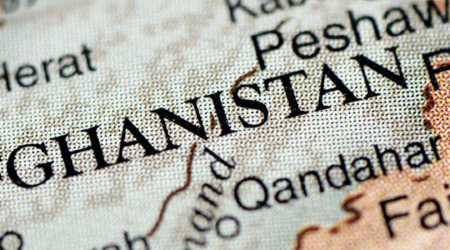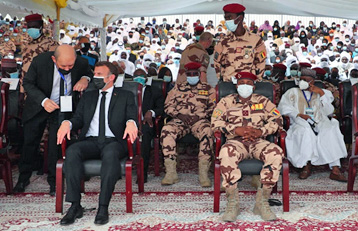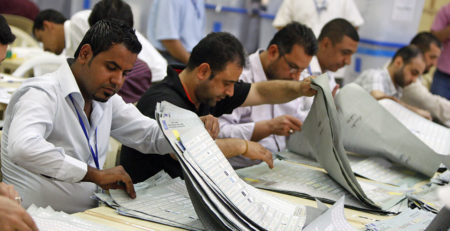Monthly Afghanistan News Roundup – January 2024
Ozair Khan
Within the framework of the Fiqhi Pathways project implemented jointly by CPI-Geneva and the Swiss FDFA’s Peace and Human Rights Division, engagement with Deobandi scholars of or close to Taliban and Pakistan is pursued to promote governance in line with IHL and Islamic jurisprudence through Fiqhi dialogue exchanges. This monthly newsletter aims to keep track of the discussions and debates among scholars on issues of governance policies of the Taliban, especially in the areas of education, social policies, and statecraft and governance institutions.
1. Afghanistan’s Regional Cooperation Initiative meeting
On January 29, the Islamic Emirate organised an “Afghanistan Regional Cooperation Initiative meeting”, which brought together representatives and ambassadors of 12 neighbouring and regional countries, most notably China, Russia, India and Iran. The purpose of this conference was to encourage positive interaction between the Taliban and regional countries and to enhance economic opportunities. The meeting was divided into two key topics: common interests and common threats. Despite not being recognised by the international community, the Islamic Emirate showcased its ability to host influential countries when it wants to. This gathering was planned as a direct response to the UN’s announcement of a reunion regarding the situation in Afghanistan in Doha on February 18 and 19. This UN event aims to discuss strategies for enhancing international involvement in a more unified way. As a reminder, the UN Security Council approved a resolution in December urging the appointment of a special envoy for Afghanistan, a role that Kabul deemed “unnecessary”.
During the regional meeting in Kabul, Amir Khan Muttaqi, the Afghan Interim Minister of Foreign Affairs, lambasted the UN by stating: “Afghanistan has gone through long imposed conflicts and has achieved peace, security, and stability – it does not need another UN special representative and/or new mission with UNAMA (United Nations Assistance Mission in Afghanistan) already on the ground – but this government stands ready and has the capacity to conduct talks on common and concerning issues with different regional and international sides.” [1]
Muttaqi also urged the delegates who attended the session in Kabul to convey the “ground realities of Afghanistan” to the UN reunion scheduled for next month in hopes of fostering a “constructive engagement”.
As reported by Zakir Jalaly, a political analyst close to the Taliban, an unnamed ambassador of a significant country in the region mentioned during the Kabul meeting that non-recognition or isolation of Afghanistan has become irrelevant, given the country’s extensive international interactions and strong economic connections with several countries. [2]
Similarly, on a different occasion, Maulvi Abdul Kabir, the Political Deputy of the Ministry of the Taliban, emphasised that the world has recognised the Taliban government. Abdul Kabir remarked: “We have political representation in 17 countries. We have transactions with the world. There is business. Although this recognition is not formal, it should, God willing, happen soon.” [3]
2. Self-Reformism
Two declarations highlight the contrasting views on self-reformism within the Taliban ranks. First, during a gathering, the Taliban Justice Minister Abdul Hakim Sharia reminded religious scholars that they should not criticise the Taliban government as it would undermine the system. However, in response to Abdul Hakim Sharia, Maulvi Abdul Salam Zaeef, one of the founding members of the Taliban in the 90s, tweeted that encouraging people not to express constructive criticisms is actually a means to weaken the Islamic Emirate. [4]
Currently, the majority of the highest representatives of the Emirate see any suggestion for self-rectification as a Western plot. Most notably, Mohammad Khalid Hanafi, the acting Minister of Vice and Virtue, recently stated: “If foreigners think that we would be impressed by their negative, baseless and untruthful propaganda, if we have even one day left in our life, we will not let go of even one principle of our Islamic government.” [5]
3. Ethnic Inclusivity
This topic continues to fuel debates. Iran’s special representative for Afghanistan, Hassan Kazemi Qomi, subtly condemned the Taliban during Kabul’s meeting mentioned earlier by explaining the importance of non-discriminatory governance.[6] In addition, Russian Foreign Minister Sergey Lavrov said at an annual news conference devoted to reviewing Moscow’s main foreign policy achievements in 2023 that the Taliban have the situation under control and “that we (meaning Russia) maintain regular communication with the Taliban, including on issues that need to be solved for them to become a fully recognised government.” Among those issues, the Russian Foreign Minister mentioned, is “the establishment of an inclusive government, which would include not only ethnic Pashtuns but other ethnic groups as well to feature political inclusivity.”[7] The Taliban felt offended by Sergey Lavrov’s comments, with the Taliban spokesperson Zabihullah Mujahid noting: “‘Afghanistan now has an inclusive and responsive government, ensuring security and stability while resolving longstanding conflicts. Russia and other nations should cooperate with Afghans and refrain from interfering in our country’s internal affairs.”[8] Similarly, the Minister of Information and Culture of the Taliban declared that “the countries that want an inclusive government in Afghanistan intend to have “spies”. [9]
Previous newsletters have clarified how the Taliban and their opponents diverge in their understanding of the term “inclusive”. In the Taliban’s eyes, the Islamic Emirate respects ethnic diversity since what matters to the current government is whether one adheres to the Deobandi ideology and not whether one is Tajik or Pashtun. But when the Taliban’s adversaries mention ethnic inclusivity, they are primarily referring to a government that acknowledges political opponents of the Taliban. Political opposition and ethnic diversity go hand in hand, as ethnic minorities have historically opposed the Taliban.
But with the recent developments in Afghanistan, the Taliban adversaries are in no mood to have a coalition government with the Taliban. The former vice-president of Afghanistan, Younous Qanouni, said “that forming an inclusive government in Afghanistan is not the solution; instead, there should be a fundamental national change in the country’s situation.”
4. Women’s Rights
In a recent controversial move, the Taliban arrested numerous women, particularly in Kabul, as part of an enforcement of the state-approved dress code. Apparently, these women were not veiling themselves properly. After taking control of the country in August 2021, the Taliban issued regulations concerning the attire of women, particularly in public settings. In actuality, these regulations were not effectively enforced in many areas, so women could freely walk with only a loose scarf. These arrests represent a significant milestone.
The Taliban did not deny the arrests but rejected the bad treatment of those rounded up. Zabihullah Mujahid, the Islamic Emirate’s spokesperson, stated: “A group of women who were involved in modelling to promote (non-Islamic clothes) were detained, advised in front of their family members, and released within hours. No woman was subject to imprisonment during this process.” [10]
In contrast, various human rights organisations and other international actors indicate that some beatings had occurred. [11]
Members of the scholarly class in Afghanistan non-affiliated with the Taliban equally disapproved of the alleged brutal arrests. The former religious political actor Abdul Rabb Rasuul Sayyaf criticised the Taliban practices regarding these arrests by explaining that the concept of prison, especially for women, is a foreign concept in Islam. [12]
Then, throughout the rest of the month, Taliban officials made declarations regarding the importance of ensuring women’s rights. In an audio recording, Haibatullah Akhunzadah, the leader of the Islamic Emirate, highlighted the improved status of females within an Islamic structure. According to him, there was no attention to women’s rights in the previous governments. In the audio, he says:
“We have issued several decrees regarding women’s rights… the previous governments have not provided women’s rights. We say don’t marry women by force, give them their bridal gift, don’t marry widows by force, and give any female her share of inheritance.” [13]
The declaration by Haibatullah Akhunzadah reflects his focus on addressing problems in rural areas. But the set of “problems” in Kabul is very different. To the Taliban, cities like Kabul are perceived as being corrupted by Westernization, so the Taliban put more effort into changing the social structure in cities and towns than they do in rural places, whichcan lead to the arrest of women.
However, Anas Haqqani, a prominent member of the Islamic Emirate, somehow toned down the declaration of Haibatullah Akhunzadah. He said in a meeting with the teachers of Sheikh Zayed University of Khost that women in remote areas of the country are still not given Sharia rights, so it is a work of process.[14] Anas Haqqani’s declaration, like that of Haibatullah Akhunzadah, highlights the Taliban’s belief that Shariah rules are the means to truly liberate women.
5. Religious and Modern Education
In a recent announcement, the Minister of Education revealed the removal of specific textbooks from the primary school curriculum, citing their contradiction with Islamic values and Afghan culture. Mansoor Ahmad Hamza, the spokesperson for the Ministry of Education, stated that the reforms will also encompass the curriculum of secondary schools (grades 7-9). [15] To address the social media backlash, the Taliban’s Minister of Foreign Affairs issued a statement assuring Afghans that the updates to the school curriculum do not marginalise modern science but incorporate modern education into the curriculum. [16]
Various declarations were made by officials of the Islamic Emirate throughout the month, highlighting the Taliban’s favourable opinions on modern education. For example, the acting Minister of Higher Education, Neda Mohammad Nadim, said “expertise causes the development of a society, and it is a need whether in the field of religious education or modern education.” [17]
Moreover, Sayed Habibullah Agha, acting Minister of Education, explained: “There will be a time that this government will be strengthened in politics, defence, economy and health and will reach self-reliance”. [18]
Mullah Khairullah Khairkhah, the Acting Minister of Information and Culture, urged young people in Kandahar to acquire religious and modern education in order to effectively serve the system, the people, and their homeland. [19]
There were significant administrative changes in education during the past month. The Taliban’s Ministry of Higher Education will grant madrasah graduates high school diplomas and university degrees to standardise the educational system. [20] Madrasah students who complete six years of education will get the equivalent of high school diplomas. A bachelor’s degree is awarded to students who finish eight years of education, while those who complete 11 years of religious education and pass a test will earn a master’s degree.
Nooruallah Shad, a former university professor in Khost, said: “Now that they are equating the academic credentials of the madrasahs with those of the universities, it will render the latter irrelevant.” [21]
Regarding the education of girls, there have been no notable changes. Girls are still barred from attending non-religious schools beyond year 6, although Zabihullah Mujahid declared recently that the Islamic Emirate is exerting its efforts to open girls’ schools. [22] In an interesting development, the Taliban convened a meeting in Kabul titled “Participation of religious leaders and scholars in strengthening relations between the nation and the government,” which included Afghanistan’s national scholars and elders from all 34 provinces. The scholars and religious elders, as reported by the Taliban, emphasised the importance of providing education to women and girls. [23]
6. Pakistan – Afghanistan Relationship
To reestablish connections between Pakistan and Afghanistan, Maulana Fazlurahman, a prominent Pakistani Islamist politician and head of the Deobandi political Party Jamat Ulema Islam (JUI-F), travelled to Afghanistan on January 8 to hold talks with top Taliban leaders. The sources of these tensions between the two countries are twofold: Pakistan accuses Afghanistan of hosting the Tehrek Taliban Pakistan (TTP) on Afghan soil while, on the other hand, the Afghans accuse Pakistanis of wrongly expelling hundreds of thousands of Afghan refugees because they might be TTP terrorists.
Before the trip, there were reports that Maulana Fazlurahman was representing the Pakistani government, but he clarified that it was not true. [24] The JUI-F chief openly stated it had been his wish to travel to Afghanistan and personally congratulate the Afghan Taliban for their ‘victory’ against the US-led foreign forces for quite some time, regardless of the ongoing issues between the two countries. The leader of JUI-F received a warm and enthusiastic reception. By interacting with the top leaders of the Afghan Taliban, he demonstrated once again that despite the Taliban’s tendency to mock Pakistani Deobandi politicians and religious scholars for partaking in the unislamic life of Pakistani politics, they nonetheless share the same religious background, enabling smoother discussions. Significantly, Fazlurahman was taken to Kandahar for a meeting with Taliban supreme leader Haibatullah Akhundzada, which is an infrequent occurrence. It was reported by the Pakistani news outlet “Tribune’ that a host of issues, including the TTP and Afghan refugees, were mentioned during this discussion. [25] Before returning to Pakistan, Fazlurahman gave an interview to an Afghan news channel in which he noted that his discussions were the first steps to resolve the problems between the two countries in the future. He also explained that while he was in Afghanistan he felt people had a love for Pakistan. Pakistani news outlets such as “Tribune” report that Haibatullah Akhunzadah would want to help organise talks between the Pakistani government and TTP as it did two years ago, but the Pakistani state is in no mood for that and instead expects the Islamic Emirate to control TTP. [26]
However, just a few days after the return of Fazlurahman, the Pakistani Army Chief, Asim Munir, boldly declared the life of a single Pakistani has more value than the entirety of Afghanistan. [27] Following this, Hamid Khorasani, a notorious Tajik Taliban commander hailing from Panjshir, issued a warning, stating that if given permission by the Taliban’s supreme leader, they could capture Pakistan within a day. [28]
Furthermore, the acting Minister of Borders and Tribal Affairs, Noorullah Noori, raised doubts about the legitimacy of the “Durand Line,” the border that separates Pakistan and Afghanistan.
References
[1] https://twitter.com/TOLOnews/status/1751953538710700039?s=20
[2] https://twitter.com/zakirjalaly/status/1752235591897338347?s=20
[3] https://twitter.com/ZawiaNews/status/1750129104815292539?s=19
[4] https://twitter.com/ZawiaNews/status/1751940435864334423?s=20
[5] https://twitter.com/TOLOnews/status/1751599429377990748?s=20
[6] https://kabulnow.com/2024/01/critical-of-the-un-taliban-hosts-their-own-conference/
[7] https://tolonews.com/afghanistan-187126
[8] https://twitter.com/AlemarahDari/status/1748598347450155095?s=19
[9] https://www.afintl.com/202401132526
[10] https://www.cbsnews.com/news/taliban-afghanistan-mass-arrests-women-girls-hijab-rule-violations/
[11] Ibid
[12] https://8am.media/fa/sayyaf-criticized-the-detention-of-girls-and-women-by-the-taliban/
[13] https://tolonews.com/afghanistan-187030
[14] https://twitter.com/TOLOnews/status/1751959344760189344?s=20
[15] https://twitter.com/TOLOnews/status/1747195237439799507
[16] https://twitter.com/MoEAfghanistan/status/1748024943831585139
[17] https://tolonews.com/afghanistan-187168
[18] https://8am.media/fa/maulvi-abdul-kabir-afghanistan-needs-a-modern-education-system/
[19] https://www.bakhtarnews.af/%d8%ae%db%8c%d8%b1%d8%ae%d9%88%d8%a7%d9%87-%da%81%d9%88%d8%a7%d9%86%d8%a7%d9%86-%d8%af%db%90-%d9%be%d9%87-%d8%af%db%8c%d9%86%d9%8a-%d8%a7%d9%88-%d8%b9%d8%b5%d8%b1%d9%8a-%d8%b2%d8%af%d9%87-%da%a9/
[20] https://www.rferl.org/a/afghanistan-madrasahs-taliban-secular-education-degrees-diplomas/32791896.html
[21] Ibid
[22] https://tolonews.com/pa/afghanistan-186812
[23] https://www.afintl.com/202401133399
[24] https://tribune.com.pk/story/2453245/fazlur-rehmans-visit-to-afghanistan
[25] https://www.youtube.com/watch?v=6dIvZ31F8v0&t=1070s&ab_channel=MuhabbatKhan
[26] https://tribune.com.pk/story/2453245/fazlur-rehmans-visit-to-afghanistan
[27] https://www.afghanistantimes.af/afghanistan-erupts-in-anger-over-pakistani-generals-derogatory-remarks/
[28] https://twitter.com/AfghanAnalyst2/status/1750755495818699200













